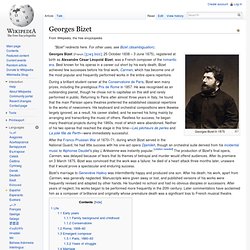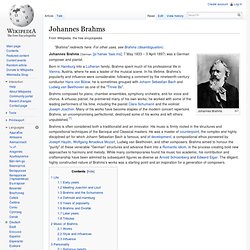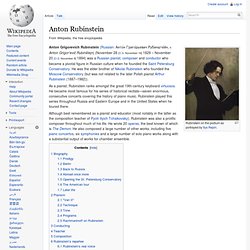

Johann Strauss II. Johann Strauss II - The Blue Danube Waltz. Herbert von Karajan conducts The Blue Danube Waltz. Johann Strauss II - Roses from the South Waltz. Georges Bizet. Georges Bizet in 1875 Georges Bizet (French: [ʒɔʁʒ bizɛ]; 25 October 1838 – 3 June 1875), registered at birth as Alexandre César Léopold Bizet, was a French composer of the romantic era.

Best known for his operas in a career cut short by his early death, Bizet achieved few successes before his final work, Carmen, which has become one of the most popular and frequently performed works in the entire opera repertoire. During a brilliant student career at the Conservatoire de Paris, Bizet won many prizes, including the prestigious Prix de Rome in 1857. He was recognised as an outstanding pianist, though he chose not to capitalise on this skill and rarely performed in public. Returning to Paris after almost three years in Italy, he found that the main Parisian opera theatres preferred the established classical repertoire to the works of newcomers.
Bizet's marriage to Geneviève Halévy was intermittently happy and produced one son. Life[edit] Early years[edit] Bizet - Carmen - Habanera. Georges Bizet Carmen PART 1 of 20 (Prelude + Sur la Place) Johannes Brahms. Johannes Brahms Johannes Brahms (German: [joˈhanəs ˈbʁaːms]; 7 May 1833 – 3 April 1897) was a German composer and pianist.

Born in Hamburg into a Lutheran family, Brahms spent much of his professional life in Vienna, Austria, where he was a leader of the musical scene. In his lifetime, Brahms's popularity and influence were considerable; following a comment by the nineteenth-century conductor Hans von Bülow, he is sometimes grouped with Johann Sebastian Bach and Ludwig van Beethoven as one of the "Three Bs". Brahms composed for piano, chamber ensembles, symphony orchestra, and for voice and chorus. A virtuoso pianist, he premiered many of his own works; he worked with some of the leading performers of his time, including the pianist Clara Schumann and the violinist Joseph Joachim. Brahms is often considered both a traditionalist and an innovator. Life[edit] Early years[edit] Photograph from 1891 of the building in Hamburg where Brahms was born.
Meeting Joachim and Liszt[edit] Johannes Brahms - Lullaby. Johannes Brahms - Hungarian Dance No. 5. Anton Rubinstein. Rubinstein on the podium as portrayed by Ilya Repin.

Anton Grigorevich Rubinstein (Russian: Анто́н Григо́рьевич Рубинште́йн, tr. Anton Grigor'evič Rubinštejn) (November 28 [O.S. November 16] 1829 – November 20 [O.S. November 8] 1894) was a Russian pianist, composer and conductor who became a pivotal figure in Russian culture when he founded the Saint Petersburg Conservatory. He was the elder brother of Nikolai Rubinstein who founded the Moscow Conservatory (but was not related to the later Polish pianist Arthur Rubinstein (1887–1982)). As a pianist, Rubinstein ranks amongst the great 19th-century keyboard virtuosos. Biography[edit] Prodigy[edit] Rubinstein was born to Jewish parents in the village of Vikhvatinets in the district of Podolsk, Russia (now known as Ofatinți in Transnistria, Republic of Moldova), on the Dniestr River, about 150 kilometers northwest of Odessa.
Russians call me German, Germans call me Russian, Jews call me a Christian, Christians a Jew. Berlin[edit] Pianism[edit] Anton Rubinstein - Piano Concerto No. 4 in D Minor Op. 70 (1864) Anton Rubinstein - Melody in F.